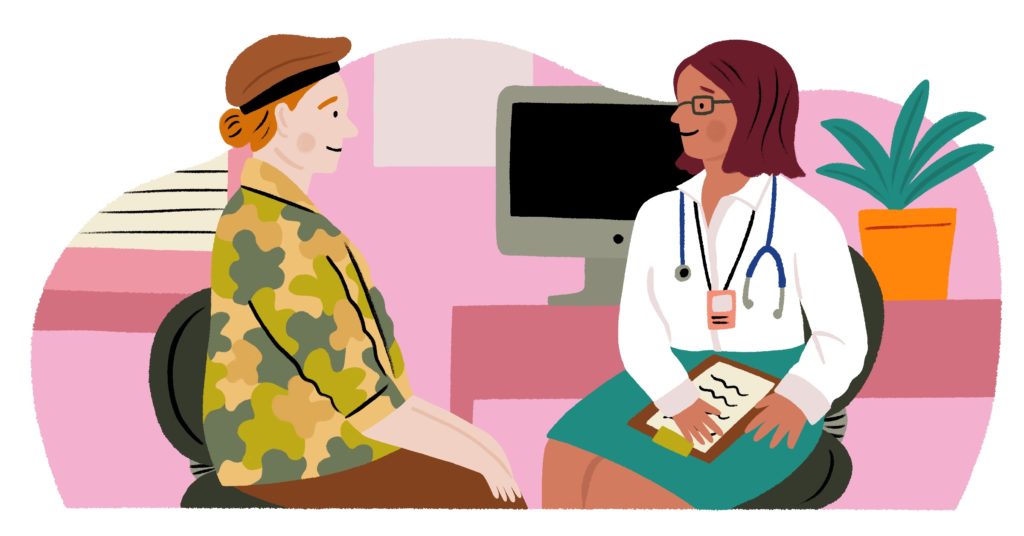
By Beth Levine
If you are a military veteran struggling with focusing, hyperactivity, controlling impulses, organization and other symptoms of ADHD, you are not alone. Rates of ADHD among veterans are on the rise.
According to a study published in the journal Medical Care, the annual prevalence of ADHD among Veterans Administration patients increased from 0.23 to 0.84 percent. Within that group, younger veterans and women have higher rates; increase rates were lowest for older and Black veterans. “The age-adjusted prevalence of ADHD in a sample of veterans using primary care or mental health clinic services more than doubled over the eight-year period from (2009 to 2016),” the study coauthors wrote.
ADHD Not Compensated by the VA
However, despite these studies, the VA doesn’t give ADHD a disability rating, which is a percentage of disability assigned to a veteran’s service-connected conditions. This means that ADHD, as a diagnosis, has not been put into law, which means compensation for the diagnosis can be daunting. “They’re not denying that it’s a real diagnosis but they do not look at it as something that occurs as a result of service,” says Lori Underwood, a managing attorney with Indiana-based Woods and Woods, a VA disability law firm. “They consider it a learning or developmental disability, and those are thought of as pre-existing conditions.”
But studies show that may not be true.
The Medical Care study authors couldn’t pinpoint a direct correlation between military service and ADHD but they hypothesize that “changing diagnostic criteria, changes in the characteristics of the VA patient population, and increases in conditions that may have overlapping symptoms with ADHD, such as PTSD (post traumatic stress disorder) and traumatic brain injury” may be at the root of the issue.
Indeed, in a study published in the Journal of Attention Disorders, researchers found that “inattention may serve as a risk factor for post-traumatic stress symptoms following combat exposure.” Another study published in the Journal of Psychiatric Research found a positive association between adult ADHD and traumatic brain injury.
What to do when denied compensation for ADHD
If left untreated, ADHD can make life very difficult for veterans to reacclimate to civilian life. Veterans may have trouble keeping a job and maintaining relationships. Some may turn to alcohol to calm down. But alcohol tends to make ADHD symptoms worse. If you think you may have ADHD that stems from your service, Underwood recommends following these steps:
1. Get an official diagnosis.
Ask your mental health care provider for a screening test if you show some of these symptoms, and they are interfering in your life. Common symptoms include:
- Poor impulse control, planning and time management skills
- Problems with focusing on tasks, prioritizing, multitasking and organizing
- Excessively active or restless
- Trouble dealing with frustration and stress
- Frequent mood swings or trouble keeping your temper
2. Prove a covered comorbidity.
ADHD often occurs in tandem with other issues such as depression, anxiety, PTSD, traumatic brain injury, obsessive compulsive disorder, bipolar disorder and alcohol abuse. A medical condition occurring in a patient at the same time as another medical condition is called a comorbidity. You need to have an official diagnosis for one of the other conditions along with the ADHD diagnosis.
3. Establish a connection between the secondary disability and your service.
You will have to work with your health care provider to prove that the non-ADHD condition was caused by your military service. Most can be traced back to trauma or stress. The more detailed you can get about this set of circumstances, the better. Your doctor needs to provide a statement confirming that the co-morbidity was probably caused by your military experiences, and was not a pre-existing condition.
4. Receive a combined comorbidities rating.
While the VA does not cover ADHD, you can get compensation for these comorbidities. If you have more than one comorbidity, combine them to get a higher rating. Check the VA disability calculator (link below) to see how much you are due. “In terms of ADHD, this will not be combined, but often the symptoms can’t be differentiated between ADHD and the connected mental limitation,” Underwood says. “The veteran will be rated on the combined symptoms if not differentiated.”
5. If you are denied, appeal your case.
You may want to hire a law firm that specializes in veteran affairs.
6. Start advocating.
As the researchers in the study published in Medical Care wrote: “Overall increases and demographic differences in adult veterans diagnosed with ADHD suggest a growing need to establish the reliability of diagnostic practices to ensure appropriate and equitable care.”
Thinking long term, you can help get the law changed by getting involved. “While there is a lot of reputable medical research out there that shows that ADHD can onset during service, it’s not something that has made its way into the Code of Federal Regulations yet,” Underwood says. “A change like that would have to come from Congress.”
Veterans can reach out to groups such as the National Organization of Veterans Advocates and National Veterans Legal Services Program. Underwood says she doesn’t know of active plans or efforts by NOVA or NVLSP on this issue specifically. But both groups actively advocate and you might reach out to them for further advocacy at the legislative level.
You can help to get the law changed by writing your representatives in Congress. “It may not seem like a lot but this does make a huge difference,” Underwood says. “I’ve seen it work in other cases.”
Help is there
So, don’t give up; reach out. Working with doctors, lawyers and advocacy groups can help a lot in getting compensation for your ADHD symptoms.
ADHD Online honors the service that military veterans have provided our nation. We encourage veterans to reach out to us for help, along with the VA and other organizations who can help with mental health and other disabilities.
Sources:
Alcohol Rehab Guide: Alcohol And ADHD





